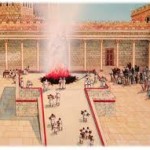The highest principle – Tzav
 Some synagogue-goers are full of complaints at this time of the year.
Some synagogue-goers are full of complaints at this time of the year.
While the latter part of Sh’mot is read they have to listen to constant detail about the architecture and building of the Tabernacle. Then they get all the laws about the sacrificial rite and the priesthood.
Where is the spirituality? Where is the poetry? Where are the ethics?
Ask those who complain what they would prefer to hear about. Their answer might possibly be, Shema Yisra’el – “Hear, O Israel, HaShem is our God, HaShem is One!” (Deut. 6:4). Or perhaps, V’ahavta l’re’acha kamocha – “Love your neighbour as yourself!” (Lev. 19:18).
This sounds like an echo of a Midrashic discussion where Ben Azzai said, “To me the most important passage in the Torah is Shema Yisra’el“, and Ben Nannes said, “I have found an even more important passage, V’ahavta l’re’acha kamocha“.
Ben Pazzi, however, suggested something quite different: Et hakeves echad ta’aseh baboker v’et hakeves hasheni ta’aseh bein ha’arbayim – “You shall offer one lamb in the morning and the second lamb at dusk” (Ex. 29:39).
The views of Ben Azzai and Ben Nannes will appeal to today’s complainers. The Shema is the spiritual foundation of Judaism. Loving your neighbour is the basis of our ethics. But the third view? We are back to the question, “Where is the spirituality? Where is the poetry? Where are the ethics?”
Ben Pazzi cannot be joking. The Midrashic discussion is too serious-minded for that. So whatever can he mean when he says he finds such inspiration in a verse that gives technical details about the daily sacrifices?
He is affirming that both the Shema and the love of neighbour are indispensable in Judaism, but in order to be able to love God as required in the Shema and to love human beings in the spirit of V’ahavta l’re’acha kamocha, we have to be willing to make an effort, to make a sacrifice – not just once or twice in one’s life, but every day, morning, afternoon and evening.
What costs us little is worth little.



